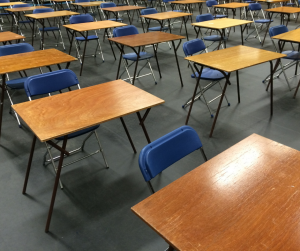Turn your papers over…now
 Children next week will learn what GCSE and A’ Level results they have achieved.
Children next week will learn what GCSE and A’ Level results they have achieved.
However, like last year, the method of arriving at the grades will not be through the process of marked examination papers.
This is because of the pandemic, which has deeply affected the education of millions of our young people.
Last year an algorithm was used to hand out grades – and it wasn’t a great success. This year it is teacher assessments that will be used.
Neither is this satisfactory.
We need a return to exams because it is the best, fairest, and most useful way of grading students’ attainment.
I hope next summer children will be able to take exams as year groups did prior to Covid-19 arriving on our shores.
Some believe other methods are better than exams, but I disagree.
There are proponents of assessments, who claim they are fairer. But there are problems with this approach.
Firstly, they have to be carried out a number of times during a course which makes it extremely difficult to moderate across the country in multiple subject areas.
This could lead to regional variations and unfairness.
It will also greatly increase the workload of teachers who have enough to do without adding to their burden.
Others have suggested a viva-type assessment in which students are questioned about their work.
But this method will still require moderation and it is unpractical with millions of students taking exams.
The main reasons exams were introduced in the first place was because universities interviewing an ever-increasing number of students became impractical.
Furthermore, this approach would have to be monitored centrally and it is expensive. And the level of administration required would be considerable.
It is possible to have some level of assessment. AS Levels were introduced at one point as a staging post between GCSE and A’ Level. This is a reasonable compromise and Wales still has them.
However, it is better that this exam is centrally marked to ensure consistency and fairness across the board.
There are those who believe coursework is the way forward, but this has major drawbacks.
It gives more opportunity for cheating, and it is extremely difficult to check whether what has been submitted is really the student’s own work.
In fact, universities are using Turnitin software to try and detect plagiarism, but this would be incredibly difficult to roll out across all schools.
There are many companies and individuals offering to write essays or complete coursework for students – for a fee.
Middle-class and bookish parents can assist children more easily than parents who aren’t academic or might not even be English speakers. And those with subject knowledge or an academic background are in a better position to help their children.
Tutors can also be employed by wealthier parents to help their child write the coursework. This again gives many children an unfair advantage.
It is a minefield and the best way to avoid these difficulties is not to grade based on coursework.
One way around some of these problems is to have ‘timed coursework’ done in class.
This is where children can bring in books and some notes that they have prepared.
The coursework is written under the supervision of a teacher in a set period of time perhaps over a three-hour period.
But doesn’t this sound like an exam?
And it is exams that should be used. They are fairer because every child sits the same test at the same time.
One way of improving the current system is to have a single exam board for the whole country and this would ensure full standardisation.
As it is, exams are centrally marked under specific criteria so there is less chance of variation across the country.
There is also careful moderation by exam boards to check their marking is consistent.
One criticism is that exams rely on memory and just regurgitating information.
However, it is possible to set probing questions and structure the exam to explore not only a child’s range of knowledge but their ability to apply understanding.
For example, in history a text can be used that requires some background knowledge of the subject matter, but the questions can also explore a child’s understanding of historical approaches regarding primary and secondary sources.
There are legitimate criticisms of exams, including the fact that they judge a student on just a short period of time when they might be unwell or be having an off-day. But there are systems in place to deal with illness – and a student can always re-sit an exam.
It is also true that some students become extremely anxious and even terrified before a test.
But by putting students through exams, it helps them learn how to deal with pressure and develop techniques that will assist them in their careers.
My own preference is to make exams the central way of grading children but to use some form of assessment and maybe a limited use of ‘timed coursework’.
The assessments should be centrally controlled and any ‘timed coursework’ would be strictly monitored.
I look forward to next summer when exams return. And I hope those students who have suffered over the last two summers will not be penalised as they go forward into further education and the world of work because of a problem that was not of their making.